[First published in 2016. A companion to this piece. Scroll all the way down for plain text.]
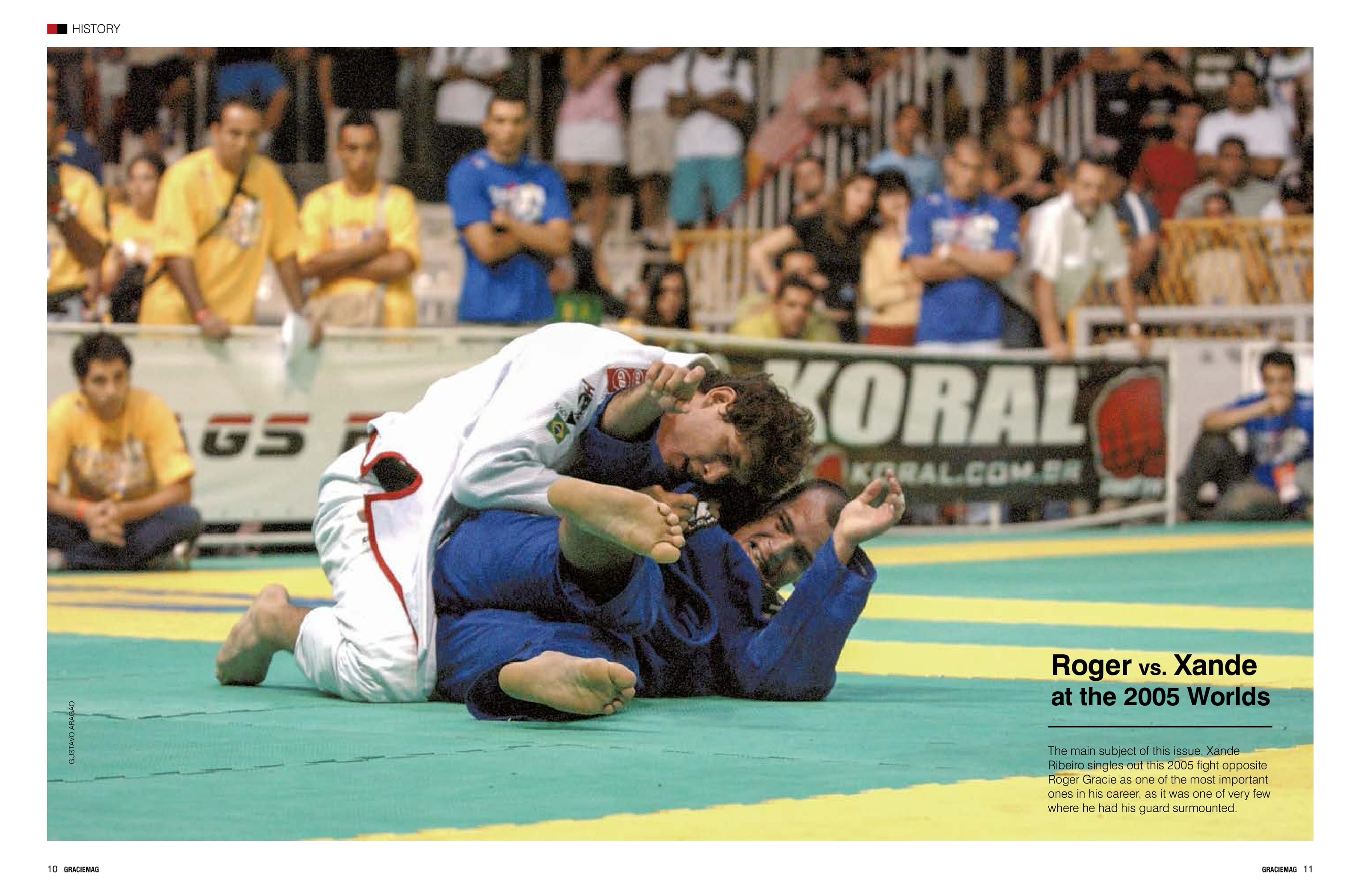
The main subject of this issue, Xande
Ribeiro singles out this 2005 fight opposite
Roger Gracie as one of the most important
ones in his career, as it was one of very few
where he had his guard surmounted.
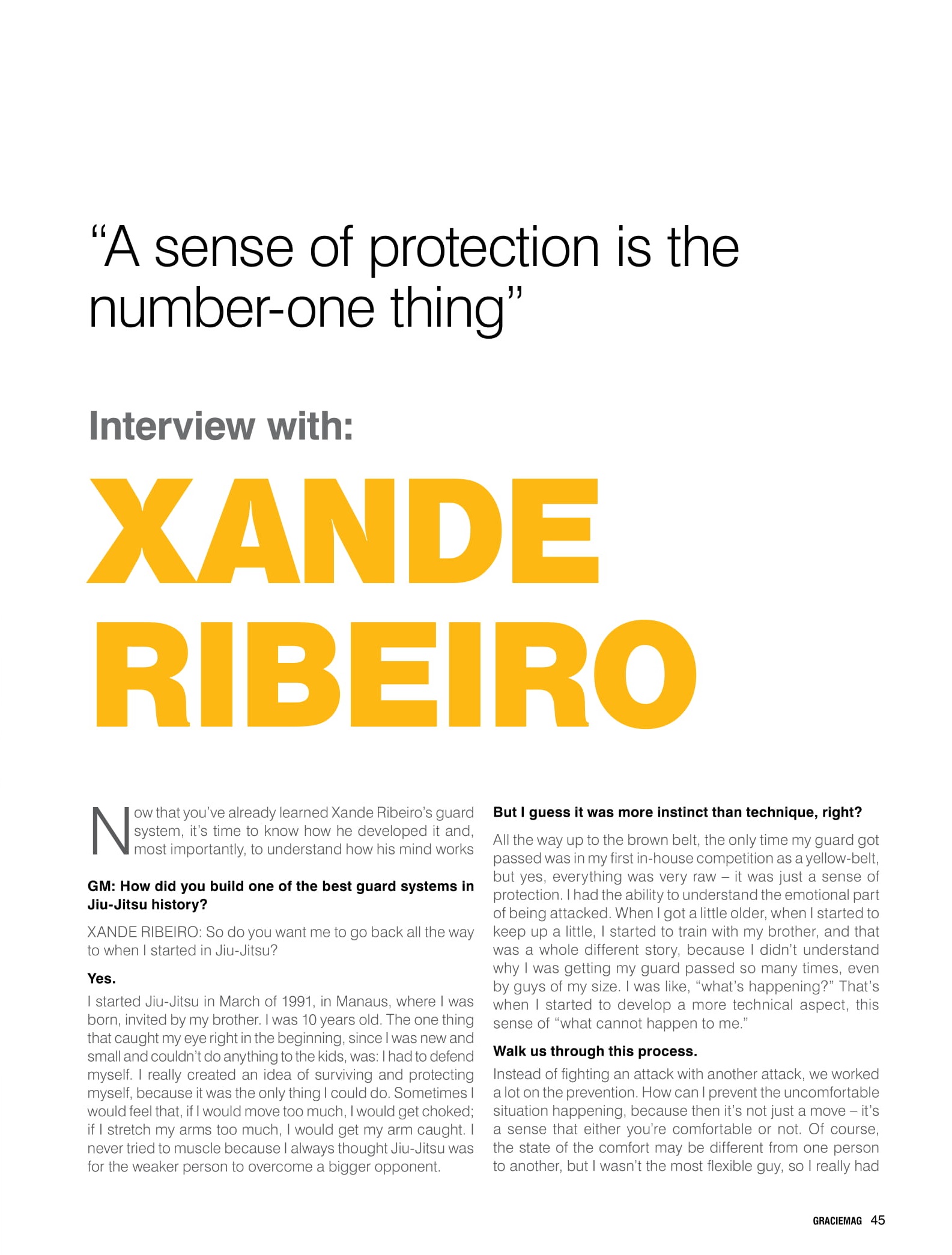
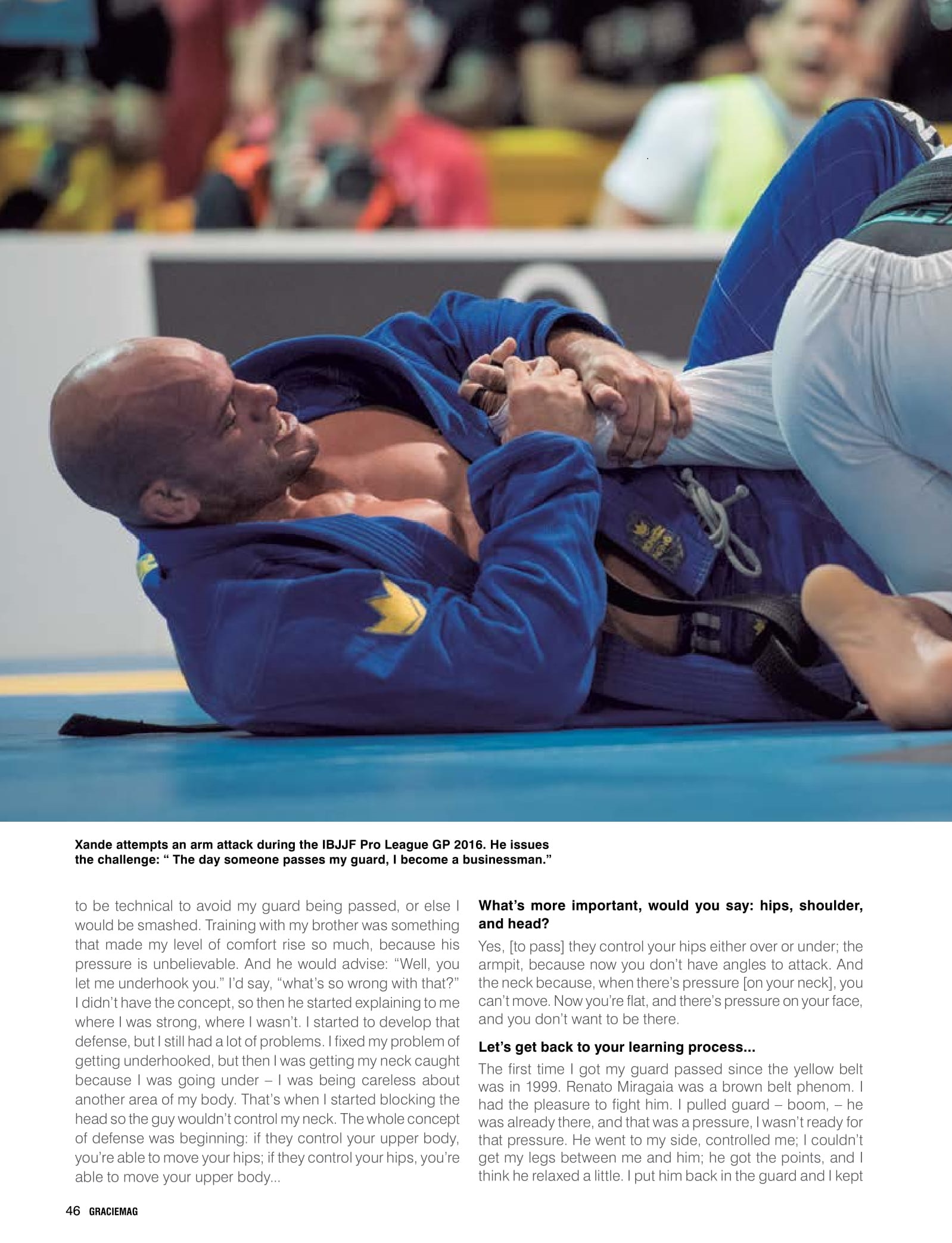
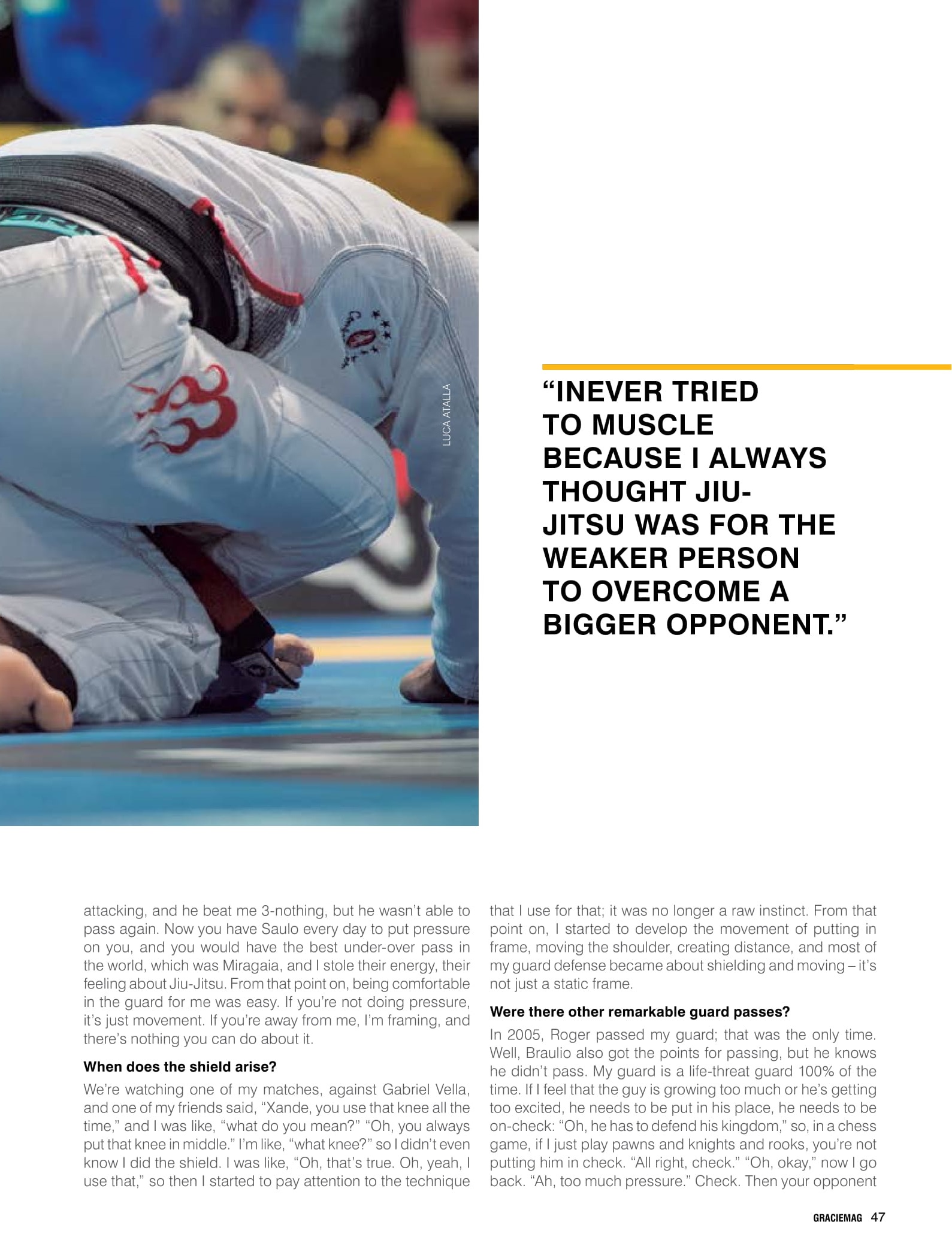
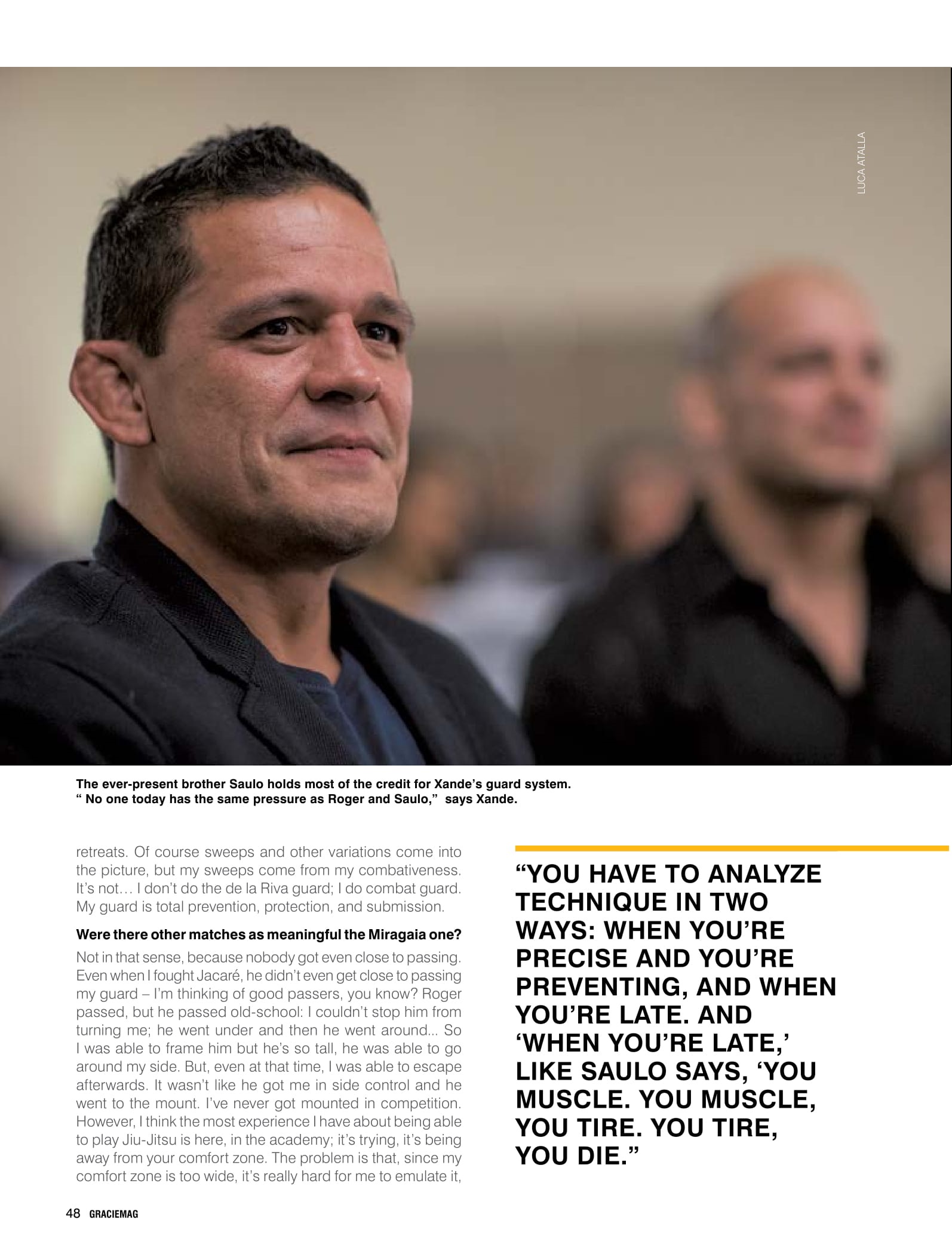
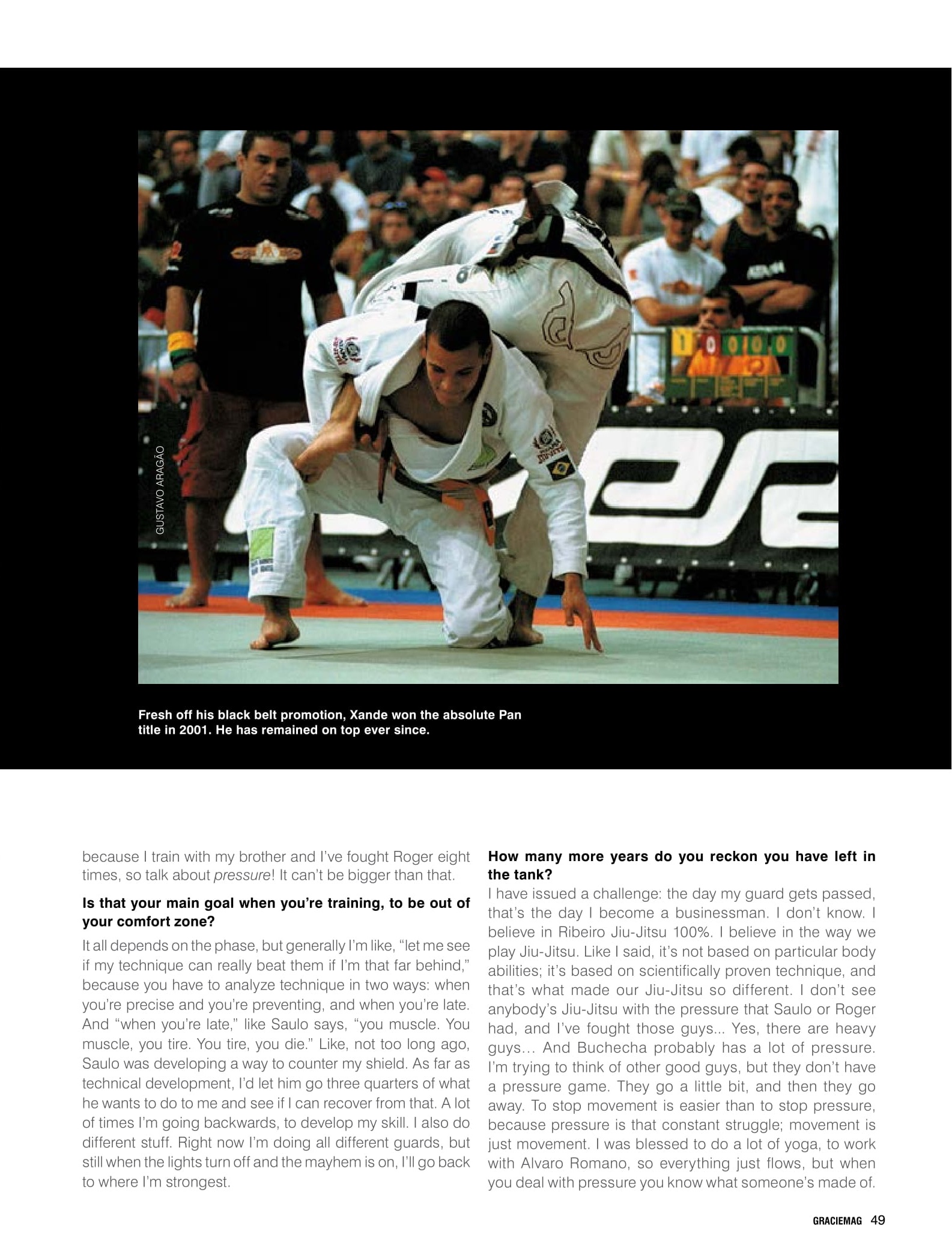
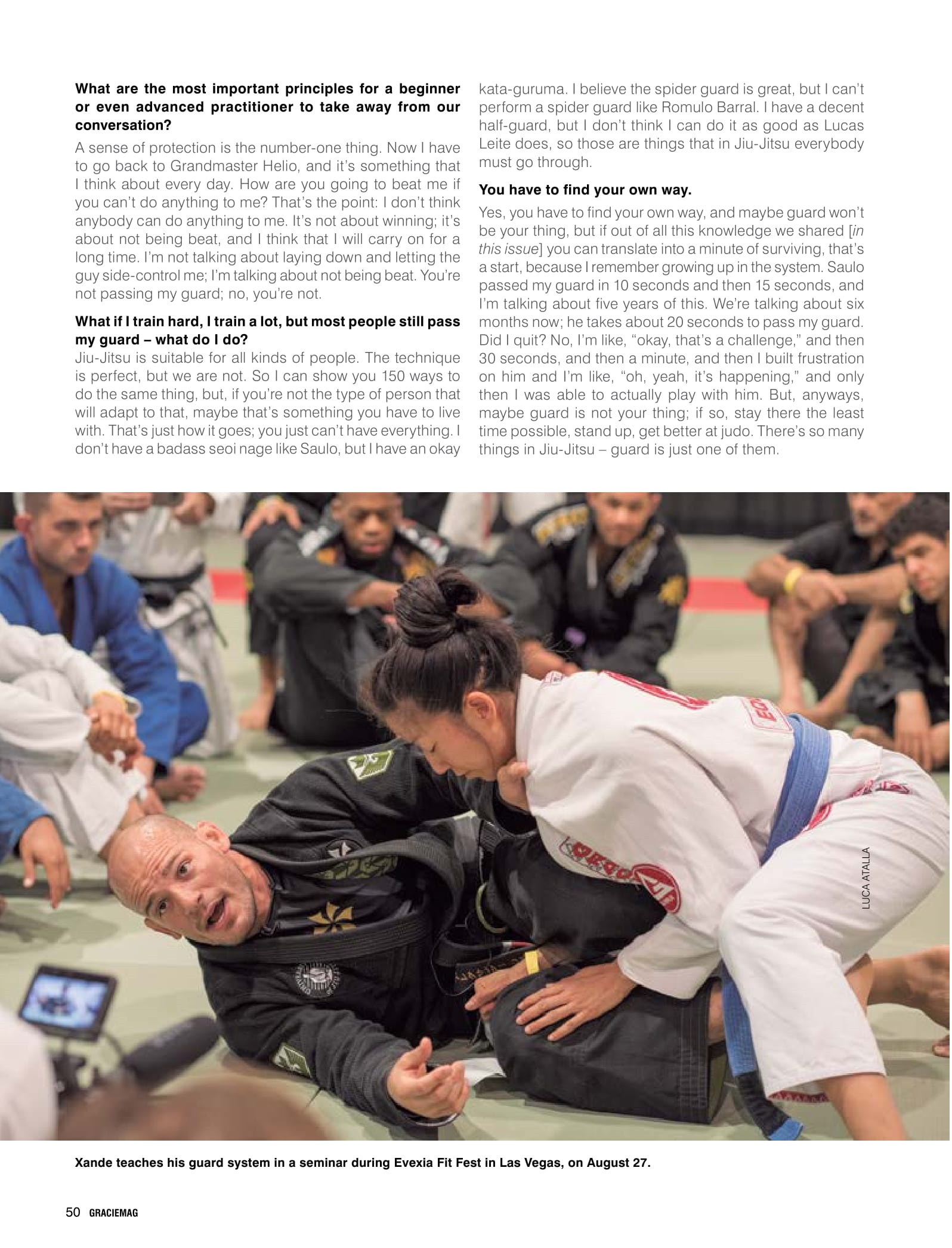
[Wanna help us continue to dig up this kind of content? Support us on Patreon.]
GM: How did you build one of the best guard systems in
Jiu-Jitsu history?
Xande Ribe iro: So do you want me to go back all the way
to when I started in Jiu-Jitsu?
Yes.
I started Jiu-Jitsu in March of 1991, in Manaus, where I was
born, invited by my brother. I was 10 years old. The one thing
that caught my eye right in the beginning, since I was new and
small and couldn’t do anything to the kids, was: I had to defend
myself. I really created an idea of surviving and protecting
myself, because it was the only thing I could do. Sometimes I
would feel that, if I would move too much, I would get choked;
if I stretch my arms too much, I would get my arm caught. I
never tried to muscle because I always thought Jiu-Jitsu was
for the weaker person to overcome a bigger opponent.
But I guess it was more instinct than technique, right?
All the way up to the brown belt, the only time my guard got
passed was in my first in-house competition as a yellow-belt,
but yes, everything was very raw – it was just a sense of
protection. I had the ability to understand the emotional part
of being attacked. When I got a little older, when I started to
keep up a little, I started to train with my brother, and that
was a whole different story, because I didn’t understand
why I was getting my guard passed so many times, even
by guys of my size. I was like, “what’s happening?” That’s
when I started to develop a more technical aspect, this
sense of “what cannot happen to me.”
Walk us through this process.
Instead of fighting an attack with another attack, we worked
a lot on the prevention. How can I prevent the uncomfortable
situation happening, because then it’s not just a move – it’s
a sense that either you’re comfortable or not. Of course,
the state of the comfort may be different from one person
to another, but I wasn’t the most flexible guy, so I really had
to be technical to avoid my guard being passed, or else I
would be smashed. Training with my brother was something
that made my level of comfort rise so much, because his
pressure is unbelievable. And he would advise: “Well, you
let me underhook you.” I’d say, “what’s so wrong with that?”
I didn’t have the concept, so then he started explaining to me
where I was strong, where I wasn’t. I started to develop that
defense, but I still had a lot of problems. I fixed my problem of
getting underhooked, but then I was getting my neck caught
because I was going under – I was being careless about
another area of my body. That’s when I started blocking the
head so the guy wouldn’t control my neck. The whole concept
of defense was beginning: if they control your upper body,
you’re able to move your hips; if they control your hips, you’re
able to move your upper body…
What’s more important, would you say: hips, shoulder,
and head?
Yes, [to pass] they control your hips either over or under; the
armpit, because now you don’t have angles to attack. And
the neck because, when there’s pressure [on your neck], you
can’t move. Now you’re flat, and there’s pressure on your face,
and you don’t want to be there.
Let’s get back to your learning process…
The first time I got my guard passed since the yellow belt
was in 1999. Renato Miragaia was a brown belt phenom. I
had the pleasure to fight him. I pulled guard – boom, – he
was already there, and that was a pressure, I wasn’t ready for
that pressure. He went to my side, controlled me; I couldn’t
get my legs between me and him; he got the points, and I
think he relaxed a little. I put him back in the guard and I kept
attacking, and he beat me 3-nothing, but he wasn’t able to
pass again. Now you have Saulo every day to put pressure
on you, and you would have the best under-over pass in
the world, which was Miragaia, and I stole their energy, their
feeling about Jiu-Jitsu. From that point on, being comfortable
in the guard for me was easy. If you’re not doing pressure,
it’s just movement. If you’re away from me, I’m framing, and
there’s nothing you can do about it.
When does the shield arise?
We’re watching one of my matches, against Gabriel Vella,
and one of my friends said, “Xande, you use that knee all the
time,” and I was like, “what do you mean?” “Oh, you always
put that knee in middle.” I’m like, “what knee?” so I didn’t even
know I did the shield. I was like, “Oh, that’s true. Oh, yeah, I
use that,” so then I started to pay attention to the technique
that I use for that; it was no longer a raw instinct. From that
point on, I started to develop the movement of putting in
frame, moving the shoulder, creating distance, and most of
my guard defense became about shielding and moving – it’s
not just a static frame.
Were there other remarkable guard passes?
In 2005, Roger passed my guard; that was the only time.
Well, Braulio also got the points for passing, but he knows
he didn’t pass. My guard is a life-threat guard 100% of the
time. If I feel that the guy is growing too much or he’s getting
too excited, he needs to be put in his place, he needs to be
on-check: “Oh, he has to defend his kingdom,” so, in a chess
game, if I just play pawns and knights and rooks, you’re not
putting him in check. “All right, check.” “Oh, okay,” now I go
back. “Ah, too much pressure.” Check. Then your opponent
retreats. Of course sweeps and other variations come into
the picture, but my sweeps come from my combativeness.
It’s not… I don’t do the de la Riva guard; I do combat guard.
My guard is total prevention, protection, and submission.
Were there other matches as meaningful the Miragaia one?
Not in that sense, because nobody got even close to passing.
Even when I fought Jacaré, he didn’t even get close to passing
my guard – I’m thinking of good passers, you know? Roger
passed, but he passed old-school: I couldn’t stop him from
turning me; he went under and then he went around… So
I was able to frame him but he’s so tall, he was able to go
around my side. But, even at that time, I was able to escape
afterwards. It wasn’t like he got me in side control and he
went to the mount. I’ve never got mounted in competition.
However, I think the most experience I have about being able
to play Jiu-Jitsu is here, in the academy; it’s trying, it’s being
away from your comfort zone. The problem is that, since my
comfort zone is too wide, it’s really hard for me to emulate it,
because I train with my brother and I’ve fought Roger eight
times, so talk about pressure! It can’t be bigger than that.
Is that your main goal when you’re training, to be out of
your comfort zone?
It all depends on the phase, but generally I’m like, “let me see
if my technique can really beat them if I’m that far behind,”
because you have to analyze technique in two ways: when
you’re precise and you’re preventing, and when you’re late.
And “when you’re late,” like Saulo says, “you muscle. You
muscle, you tire. You tire, you die.” Like, not too long ago,
Saulo was developing a way to counter my shield. As far as
technical development, I’d let him go three quarters of what
he wants to do to me and see if I can recover from that. A lot
of times I’m going backwards, to develop my skill. I also do
different stuff. Right now I’m doing all different guards, but
still when the lights turn off and the mayhem is on, I’ll go back
to where I’m strongest.
How many more years do you reckon you have left in
the tank?
I have issued a challenge: the day my guard gets passed,
that’s the day I become a businessman. I don’t know. I
believe in Ribeiro Jiu-Jitsu 100%. I believe in the way we
play Jiu-Jitsu. Like I said, it’s not based on particular body
abilities; it’s based on scientifically proven technique, and
that’s what made our Jiu-Jitsu so different. I don’t see
anybody’s Jiu-Jitsu with the pressure that Saulo or Roger
had, and I’ve fought those guys… Yes, there are heavy
guys… And Buchecha probably has a lot of pressure.
I’m trying to think of other good guys, but they don’t have
a pressure game. They go a little bit, and then they go
away. To stop movement is easier than to stop pressure,
because pressure is that constant struggle; movement is
just movement. I was blessed to do a lot of yoga, to work
with Alvaro Romano, so everything just flows, but when
you deal with pressure you know what someone’s made of.
What are the most important principles for a beginner
or even advanced practitioner to take away from our
conversation?
A sense of protection is the number-one thing. Now I have
to go back to Grandmaster Helio, and it’s something that
I think about every day. How are you going to beat me if
you can’t do anything to me? That’s the point: I don’t think
anybody can do anything to me. It’s not about winning; it’s
about not being beat, and I think that I will carry on for a
long time. I’m not talking about laying down and letting the
guy side-control me; I’m talking about not being beat. You’re
not passing my guard; no, you’re not.
What if I train hard, I train a lot, but most people still pass
my guard – what do I do?
Jiu-Jitsu is suitable for all kinds of people. The technique
is perfect, but we are not. So I can show you 150 ways to
do the same thing, but, if you’re not the type of person that
will adapt to that, maybe that’s something you have to live
with. That’s just how it goes; you just can’t have everything. I
don’t have a badass seoi nage like Saulo, but I have an okay
kata-guruma. I believe the spider guard is great, but I can’t
perform a spider guard like Romulo Barral. I have a decent
half-guard, but I don’t think I can do it as good as Lucas
Leite does, so those are things that in Jiu-Jitsu everybody
must go through.
You have to find your own way.
Yes, you have to find your own way, and maybe guard won’t
be your thing, but if out of all this knowledge we shared [in
this issue] you can translate into a minute of surviving, that’s
a start, because I remember growing up in the system. Saulo
passed my guard in 10 seconds and then 15 seconds, and
I’m talking about five years of this. We’re talking about six
months now; he takes about 20 seconds to pass my guard.
Did I quit? No, I’m like, “okay, that’s a challenge,” and then
30 seconds, and then a minute, and then I built frustration
on him and I’m like, “oh, yeah, it’s happening,” and only
then I was able to actually play with him. But, anyways,
maybe guard is not your thing; if so, stay there the least
time possible, stand up, get better at judo. There’s so many
things in Jiu-Jitsu – guard is just one of them.
